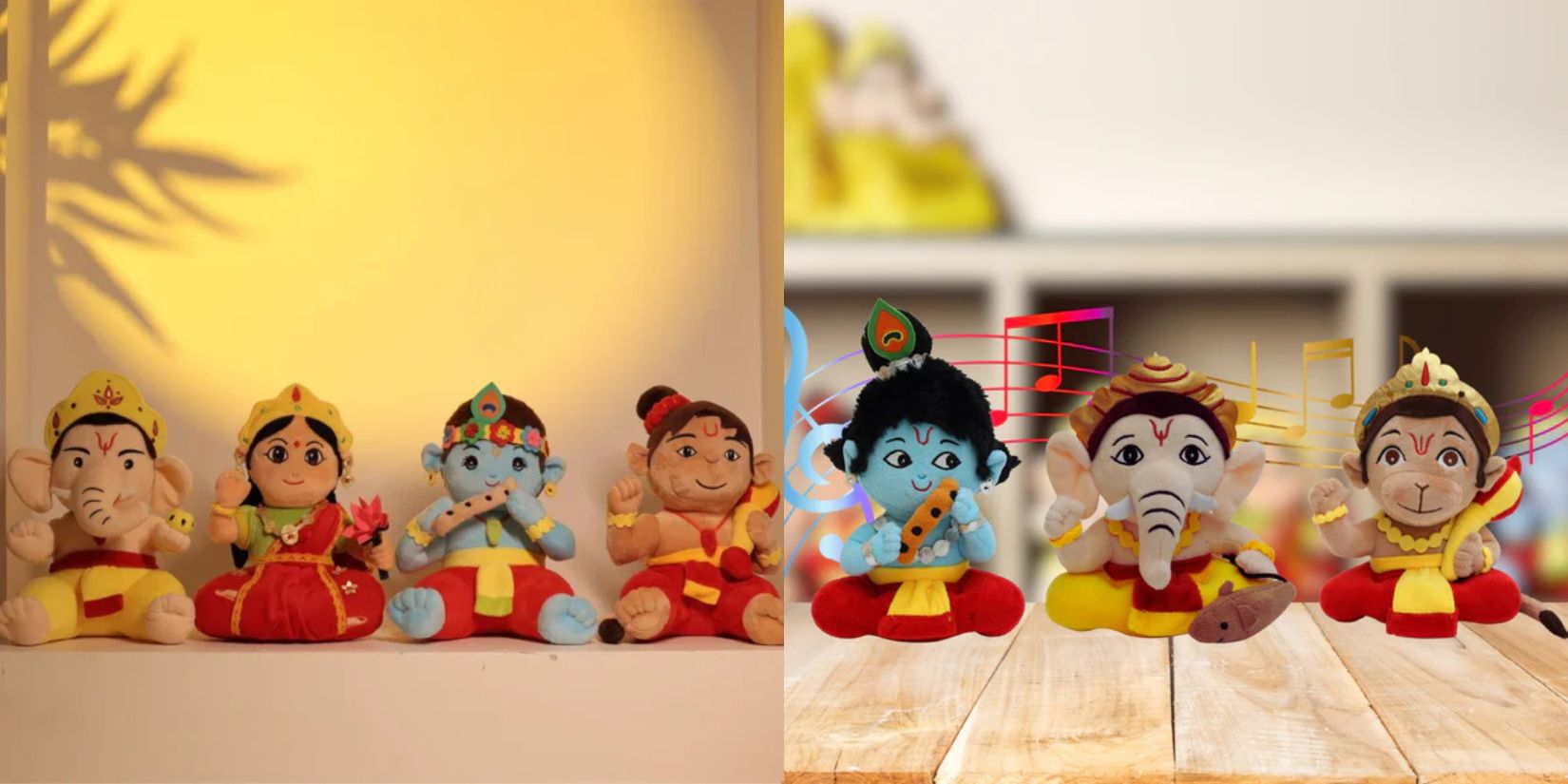Currently Empty: $0.00
The Power of Storytelling: Teaching Kids About Indian Gods and Heroes
Storytelling has always been a powerful medium for conveying important lessons, preserving cultural heritage, and fostering creativity. For children, stories have the unique ability to open windows to imagination, values, and character-building. Among the rich narratives in world history, Indian mythology holds an exceptional place, offering a treasure trove of wisdom, morality, and adventure. By introducing kids to Indian gods and heroes, parents and educators can help children develop a deeper connection with their cultural roots, instill moral values, and spark creativity. This blog explores the significance of storytelling in teaching kids about Indian mythology for kids, Hindu folklore, and Indian culture.
Why Indian Mythology is Important for Kids
Indian mythology is not just about gods, demons, and epic battles; it is a repository of timeless values, moral lessons, and spiritual teachings. These ancient stories offer more than just entertainment; they serve as spirituality for kids and character building for kids. By introducing children to these mythological narratives, they learn about virtues such as courage, kindness, honesty, loyalty, and resilience.
The diverse range of gods and heroes in Indian mythology provides a perfect platform for introducing children to different life lessons. From the bravery of Lord Rama in the Ramayana to the wisdom of Lord Krishna in the Mahabharata, every mythological figure offers a lesson that children can resonate with. These teachings help children understand the importance of good conduct, respecting elders, and embracing diversity.
Teaching Through Indian Folklore for Children
Indian folklore for kids is a rich tradition that includes stories passed down through generations. These folk tales often blend mythological figures with everyday life, teaching children important lessons about family, community, and the natural world. For example, stories about Lord Ganesha, Lord Shiva, and Devi Saraswati are not just about divine powers; they teach kids about wisdom, patience, creativity, and respect for knowledge.
Folk tales rooted in Hindu folklore for children also often explain the significance of Indian festivals for kids, such as Diwali, Holi, and Navaratri. By integrating these stories into children’s daily lives, we can create lasting memories of cultural learning that align with their growth and development.
Spirituality for Kids: Lessons Through Mythological Stories
One of the key components of Indian mythology for kids is its spiritual depth. Indian gods and goddesses represent qualities that children can aspire to, such as Lord Vishnu’s protection, Lord Shiva’s wisdom, or Goddess Lakshmi’s abundance. These figures and their stories provide children with a deeper understanding of spirituality and ethics.
Introducing Kids to Hindu Gods
Each Hindu god and hero has unique qualities that children can learn from. Let’s look at a few:
- Lord Ganesha, the remover of obstacles, teaches kids the importance of perseverance and overcoming challenges.
- Lord Krishna, with his playful nature and deep wisdom, is a perfect role model for teaching children about love, friendship, and truthfulness.
- Lord Shiva, as the lord of meditation, offers children a path to understanding peace and detachment.
- Devi Saraswati, the goddess of knowledge, encourages children to respect education and the power of learning.
By introducing kids to these divine characters through mythological stories, parents and teachers create a space for spirituality for kids. Children not only learn the values and morals but also experience a deeper connection to their cultural heritage.

Character Building Through Mythology
Indian mythology is filled with extraordinary characters who face challenges and embody various virtues. Character building for kids is an essential part of these stories. Through stories of Rama, Krishna, Hanuman, and other heroes, children learn about integrity, sacrifice, and the triumph of good over evil. These figures serve as moral compasses, guiding children toward becoming responsible, compassionate, and strong individuals.
Creativity Through Mythology: Engaging Children with Stories
The most beautiful aspect of Indian mythology is the freedom it offers for creative exploration. Children’s imagination can run wild with stories of divine realms, magical creatures, and heroic adventures. These stories encourage creativity through mythology, allowing kids to create their own versions of the gods and heroes. By engaging with these stories, children also develop storytelling skills, which help enhance their overall cognitive and emotional growth.
Tools for Storytelling
To make the experience of learning about Indian gods and heroes even more engaging, storytelling tools for kids such as books, audio stories, and interactive toys can be incredibly helpful. These tools foster curiosity and provide a multisensory approach to learning. For example, figurines and statues of Hindu gods, such as Baby Ganesha, Baby Krishna, Baby Rama, Baby Shiva, and Devi Saraswati, can be a wonderful addition to a child’s play area. These toys not only serve as cultural learning tools but also act as a physical representation of the stories they teach.
For instance, the Baby Ganesha Small (20 cm) statue can introduce children to the story of Ganesha and his role in overcoming obstacles, while the Mantra Chanting Baby Krishna (23 cm) toy can help teach kids the importance of devotion and love. These tangible representations of gods allow children to connect with the mythology on a deeper level and keep them engaged with the lessons.
These products help children connect with the characters in the mythology, creating a more hands-on and immersive learning experience. The inclusion of mantra chanting in some of these figures further enriches the experience, as kids can listen to sacred mantras and understand the significance behind them.
Indian Festivals for Kids: A Fun Way to Learn Culture
Learning about Indian festivals for kids is an exciting way to introduce them to the vibrant culture of India. Festivals such as Diwali, Holi, and Navaratri are deeply rooted in mythology and provide great opportunities for children to learn about Indian culture for kids. These festivals celebrate the triumph of good over evil, the importance of love and kindness, and the joy of family togetherness.
By using cultural learning tools like books, games, and crafts related to Indian festivals, children can learn about the significance of these festivals and understand the stories behind them. Incorporating mythological figures like Lord Rama during Diwali or Lord Krishna during Holi makes these festivals even more meaningful.
FAQs
What are some benefits of teaching kids about Indian mythology?
Teaching kids about Indian mythology helps them connect with their cultural roots, build character by learning important life lessons, and understand spiritual values. It also sparks their creativity through engaging stories and characters, fostering emotional growth.
How can I introduce my kids to Indian mythology?
You can introduce Indian mythology to kids through books, storytelling, mythological toys, and festivals. Engaging children with figures like Lord Ganesha, Lord Krishna, and Devi Saraswati helps bring these stories to life and makes learning fun.
Why are mythological figures important for kids?
Mythological figures offer valuable lessons about virtues such as courage, kindness, honesty, and perseverance. They help children develop strong moral values and a sense of spirituality while connecting with their cultural heritage.
What are some creative ways to teach kids about Indian gods?
You can use storytelling tools for kids, such as books and interactive toys like Baby Ganesha, Mantra Chanting Krishna, and Baby Shiva statues, to bring these gods to life. Creating crafts, watching animated stories, and celebrating Indian festivals also provide fun ways to learn.
How can Indian mythology contribute to character building in children?
Indian mythology teaches important virtues through the stories of gods and heroes. Lord Rama’s righteousness, Lord Krishna’s wisdom, and Hanuman’s loyalty are all traits that children can learn from, helping to build a strong, moral character.
Conclusion
The power of storytelling through Indian mythology is immense. It has the potential to teach kids valuable life lessons, introduce them to spiritual and cultural values, and encourage creativity. By using storytelling tools for kids, such as books, toys, and festival celebrations, children can develop a deep appreciation for Indian culture for kids, while learning from the mythological heroes and gods. The journey of exploring Indian folklore for children will leave a lasting impact, shaping young minds to grow with wisdom, kindness, and resilience.






